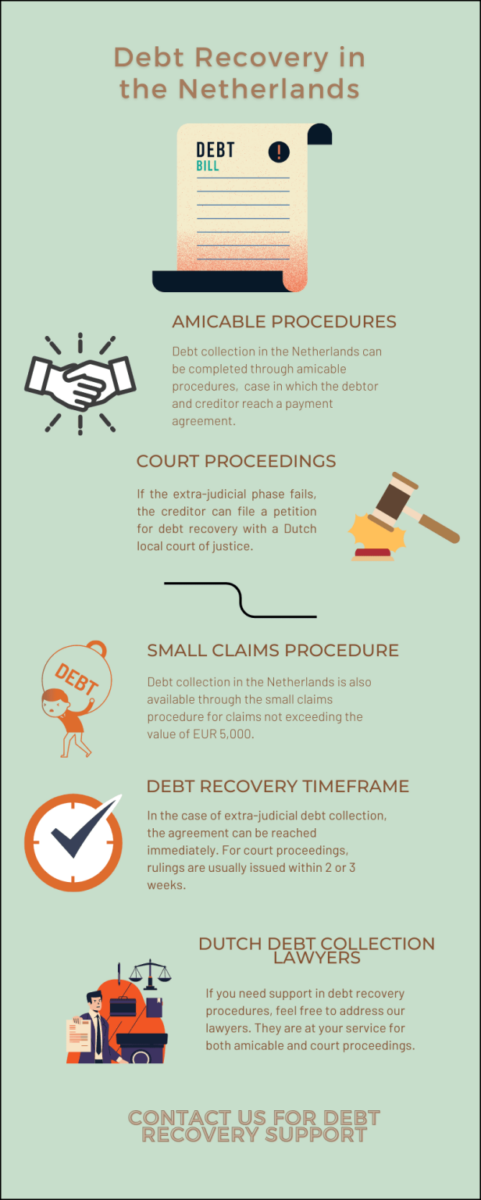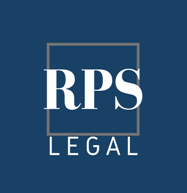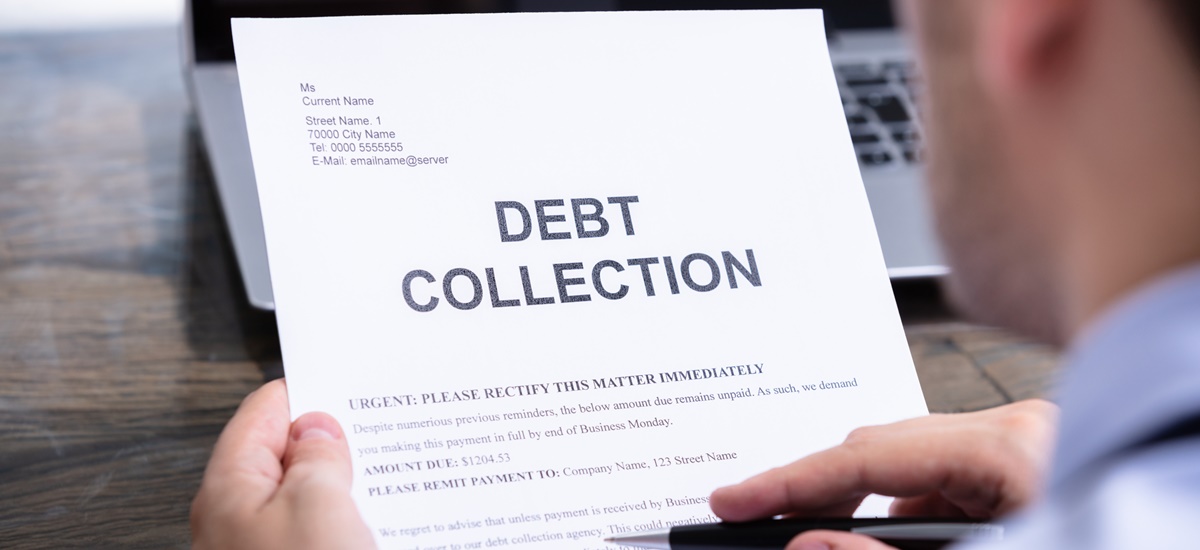Our Dutch lawyers are specialized in debt collection proceedings in Amsterdam, Rotterdam, and throughout the country. Our team of lawyers is able to assist clients in the process of collecting the due debts and our assistance focuses on trying to solve the due payment out of court, whenever possible.
Table of Contents
Debt recovery assistance in Netherlands
Debt collection refers to the process of pursuing due payments owed by individuals or businesses. In the Netherlands, this is a process that can take place with the help of an agency or a lawyer who can help the client go through the judicial collection phase if the case requires this stage.
| Quick Facts | |
|---|---|
| Applicable law | Dutch Civil Code |
|
Other specific regulations that apply (YES/NO) |
Yes, EU directives may be invoked. |
|
Types of debts that can be chased in the Netherlands |
Debts arising from: – commercial contracts, – unpaid credit, – mortgages, – business debt, – bank loans, etc. |
| Availability of out-of-court procedures (YES/NO) | Yes, extra-judicial procedures can be used in debt collection cases in the Netherlands. |
| Court proceedings available (YES/NO) |
Yes, court proceedings are also in place. |
| Types of debt collection procedures in court |
– small claims procedures for amounts below EUR 5,000, – court litigation |
| Court in charge of debt collection procedures |
– interlocutary courts for summarized procedures, – district courts for litigaiton cases |
| Existence of minimum claim for court proceedings (YES/NO) |
No |
| Duration of amicable debt recovery process in the Netherlands (approx.) |
Through an amicable procedure, the debt can be settled in a few days, if the debtor cooperates. |
| Duration of debt recovery through court application (approx.) | Court proceedings in debt recovery cases in the Netherlands are completed in about 2 to 3 weeks. |
| Recognition of foreign court order related to debt collection (YES/NO) |
Yes, based on mutual agreements with other countries |
| Possibility to use the services of debt collection agencies/lawyers (YES/NO) |
Yes, claimants can use debt recovery agencies, lawyers and bailiffs. |
| Availability of debtor protection measures (YES/NO) |
Yes, a defendant can file an opposition against a debt claim. |
| Debt collection services available (YES/NO) |
We offer debt collection services in the Netherlands. |
| Available debt collection services | We are a law firm who can offer support in extra-judicial and court proceedings in relation to all types of debt collection. |
| When to start the debt collection procedure | Once the debtor fails to meet the payment deadline outlined in the agreement/contract. |
|
Mediation |
Our lawyers recommend mediation for amicable resolution in debt collection disputes. |
|
Amicable collection |
Through negotiation and communication, without resorting to legal action or other debt collection tactics. |
| Appealing (YES/NO) |
YES |
| Summons for payment |
Debt collection begins with a writ of summons served by a Dutch bailiff, detailing the creditor’s claim and reasons. |
| Bankruptcy collection |
If the debtor is unable to pay his/her debts by the time he/she is required to do. |
| Forced execution |
The creditor enforces debt repayment when debtors fail to comply voluntarily. |
| Relevant documents for debt collection |
– unpaid invoices, – payment reminders, – demand letters, – agreements between the parties, – debt collection letter, etc. |
| Asset seizure | Only through a court order |
| Types of assets subject to seizure |
– movable properties, – real estate, – shares, etc. |
| Areas of debt collection |
– mortgage debts, – commercial debts, – rent debts, – consumer debts, etc. |
| Validity period for court judgments |
20 years from the date the order was issued. |
| Enforcing foreign judgments in the Netherlands |
Must submit relevant documents to the Dutch court (certified copy of the foreign judgment, declaration of its enforceability). |
| Debt collection principles |
– fair treatment of debtors, – adhere to legal regulations, – transparency in debt communication, – pursue reasonable repayment solution |
| Additional services provided by our law firm in Netherlands |
– VAT registration in Netherlands, – company formation, – accounting, – trademark registration, etc. |
Extrajudicial debt collection is preferable in many cases and, with the help of our team, creditors can avoid requesting a court order for enforcement. Nevertheless, if this becomes mandatory, our team is ready to provide the needed support during the collection phase and for the seizure of assets.
The Netherlands is an economically well-developed country, with a favorable business climate. This is why many foreign investors choose to open a company here or sign contracts with Dutch companies. Nevertheless, the country’s numerous foreign business transactions can often result in debts.
Our debt collection agency in the Netherlands is made of lawyers who can propose legal solutions that will be beneficial to you right from the start.
The two procedures associated with debt collection in the Netherlands
In the Netherlands, the process of collecting debts is divided into two phases:
- the extra-judicial phase,
- the legal phase.
The most important distinction between the two phases is that the latter entails judicial proceedings, which could raise costs. When dealing with financial recoveries, the most suitable solution is to use a debt collection agency in the Netherlands.
The debt collection process in the Netherlands
In the Netherlands, payments are frequently made after several demands and reminders and extrajudicial collections are reommended in the debt collection process.
For debt collection in the Netherlands, there are usually sent several written demands for payment and collection out of court. If the payment has not been honored, the collector can transfer this matter to a specialized agency – debt collection lawyers who can litigate beyond the 25,000 euro limit and can also petition a debtor’s bankruptcy.
In case of bankruptcy, the debtor receives a summons and has the obligation to respond in six weeks to this document, with the possibility of an extension for another six weeks. After this process, there are sustained oral arguments and, when the two parties can not reach an amicable agreement, the unpaid creditor can start the legal proceedings.
The average time from the issue of proceedings to judgment, if not disputed or defended, lasts about two months. A part of the legal costs can be recovered from the debtor and the amount is determined by the court.
Below, our team of agents who specialize in debt collection in the Netherlands lists the main steps for debt collection, including extrajudicial and judicial collection included:
- The first demand letter: our team will attempt the first contact with the debtor, via letters and/or phone calls.
- The payment arrangement: if the debtor is responsive, we can arrange a payment schedule, suitable for both parties.
- The second demand: if the debtor refuses the payment schedule or if he/she does not comply, in most cases, this will mark the end of the extrajudicial phase.
- The legal proceedings notification: the debtor needs to be informed of the fact that the creditor, through his/her representatives, will commence the judicial proceedings.
- Enforcement: upon obtaining an enforcement instrument for the due debt, the creditor can start the seizure of assets.
Please note that this is only a brief description of the process of debt collection in the Netherlands and the phases, although they are general ones, can vary from one case to the other. Requesting specialized aid is recommended and important, especially in those situations in which the debt is a significant amount. Here is also an infographic on Dutch debt recovery:

Arbitration and mediation for recovering the debt
With a thorough understanding and application of the law, our debt collection agency in the Netherlands can offer support to both local and foreign creditors facing difficulties in recovering outstanding amounts of money.
When a debt collection case is solved outside of court, the process of debt collection can be agreed upon with the help of arbitration, and mediation and secured through a payment agreement. When the case is taken to court, the legal proceedings will end with a judgment that will still allow the debtor to comply voluntarily. If he/she fails to do so, then the creditor is entitled to start the execution or the enforcement of the measures. The court bailiff is the one authorized to enforce these measures and will oversee the process so that the creditor receives his/her claim. The bailiff, the public official who is responsible for the actual enforcement, is a participant in the process. His role includes the following:
- to serve the enforceable document to the debtor.
- to demand that the debtor complies with the obligation to perform.
- to receive the payment when the debtor makes the payment.
- to seize the assets
- to demand assistance, as needed (for example from the police) when seizing the assets.
The fees for the bailiff are fixed ones and, in some cases, the debtor will need to also add these fees to the payment amount.
Foreign investors who are owed debts by a Dutch legal entity or citizen can also reach out to one of our agents for complete information on the enforcement of a foreign court decision in the Netherlands as well as collecting debts as per an enforcement order issued in another EU country.
Summary proceedings in debt collection in the Netherlands
If the debtor has no justifiable excuse for not paying the debt, a summary process may be considered. This entails launching an action for temporary relief in which the defendant is served a summons. This is a straightforward procedure as the District Court hears arguments from the plaintiff and the defendant before enforcing a decision.
There are two crucial things to remember about a summary proceeding in Dutch debt collection:
- it is possible to appeal a summary ruling to the higher courts;
- if the appeal is granted, the verdict will no longer be valid.
If the summarized debt collection procedure is not simple, it might be required to rely on arguments based on the specifics of the case. The court will typically give both parties time for the preparation and submission of arguments.
In such cases, the possibility of appealing the case can further complicate and prolong the procedures. As a result, these proceedings typically take longer than a year to resolve. This is why you can collaborate with our debt collection agency in the Netherlands which can avoid such lengthy processes, when possible.
Seizure of assets in the Netherlands
A key step and one that guarantees that the creditor does recover his/her due debts occurs when the actual seizure of assets takes place. Movable and immovable assets can be seized, however, the two primary conditions for enforcement are to have an actual enforceable document (the court order, for example) and to serve the document, prior to commencing the enforcement, to the debtor against whom the measure is taken.
The seizure of assets or the attachment can take place for:
- Movable property: this can include furniture, some collection items, ships, vehicles, and others.
- Real estate: the creditor can attach the property owned by the debtor and this is recorded in the Land Registry.
- Shares: bearer rights, registered shares, and the rights to other registered securities can be taken by the creditor.
- Others: the debtor’s rights against a third party, also known as an attachment by garnishment.
Do not hesitate to enquire with our debt collection agency in the Netherlands about the best course of action to recover any amount of money in the shortest time.
In general, the creditor can have the right to decide the assets that will be attached. However, those that concern basic necessities, such as clothing or food as well as items that are used for educational purposes or by the debtor for his/her work, cannot be seized. When wages are subject to attachment, only a portion thereof can be seized. The executor is allowed to attach several categories of assets at the same time, for example, movable property and real estate.
Once the enforcement procedures have begun, the debtor is no longer able to perform any actions regarding the assets that would bring prejudice to the creditor. For example, he/she cannot sell immovable assets, and even if he/she does, the buyer would not be able to claim that the property belongs to him/her. Income that may arise from the asset, also in the case of real estate that is rented, for example, is also subject to the attachment. It is important to note that the attachment of real estate becomes effective once it is registered in the Land Registry. The debtor is protected against juridical acts from the debtor once the attachment is complete.
Creditors aiming to recover debts in the Netherlands should note that the validity period for a court judgment is twenty years from the day following the one in which the order was handed down. The prescription period is five years. One of our specialists can give you more details about the validity of the enforcement measures.
Our team of debt collection lawyers in the Netherlands can assist individuals and companies looking to recover outstanding payments. Our services refer both to extrajudicial measures as well as legal representation in litigation. Our approach is focused on quick and efficient debt recovery by attempting to negotiate a solution with the debtor that will suit the needs of both parties. When this is not possible, when the debtor is not willing to cooperate or is no longer able to make the payment (like in the case of bankruptcy), our team will commence the legal proceedings. These will allow the creditor to recover his/her due amounts within the limit stipulated by the law (the limits of assets that can be seized).
What are the main requirements for enforcing foreign judgments in the Netherlands?
The party that wishes to enforce a foreign judgment in the Netherlands, that is a judgment issued in another member state or an EU court decision, must present the following documents to the local Dutch court and/or authorities:
- a copy of the issued judgment (a certified copy is usually required).
- a certificate that states the enforceable nature of the judgment and contains relevant details, for example, information on the recoverable costs for the proceedings.
In general, there is no pre-determined timeframe for granting recognition and enforcement. In some situations, a judgment that is issued in another EU member state can be both recognized and enforced without any other mandatory proceedings.
For judgments rendered in a state that is part of a treaty, such as the Lugano Convention, the requirements for the mandatory documents may differ, however, in principle the two mentioned above will remain (a certified judgment copy and the declaration of enforceability).
A limitation period can apply for the enforcement of a foreign judgment and this timeframe can be of twenty years. The foreign statute of limitations has no implications on how a foreign judgment is recognized and enforced in the Netherlands.
Here is also a video on debt recovery in the Netherlands:
EU small claims procedures in the Netherlands
For foreign claims up to €5,000, the European Small Claims Process can be employed in debt recovery in the Netherlands. It is a pretty straightforward process that is applicable to small claims in practically all EU member states.
It is possible to apply for this procedure if both your debtor and creditors are citizens of an EU member state. The European Small Claims process form A must be filled out.
The completed form must be submitted to the appropriate court together with all supporting documentation. Debt collection procedures completed this way imply a shorter procedure.
The European Small Claims Procedure Form C will be filled out by the court after it has received the form. Along with form A, this will be delivered to the other party involved in debt collection in the Netherlands. Here are the main time frames to expect:
- after receiving the form, the applicant will have 14 days to submit the documents to the court;
- after that, the counterparty has 30 days to reply;
- within 14 days of the court receiving the defense, a copy will be forwarded to the claimant.
The debtor’s defense must be submitted within 30 days, after which the court must reply. The judge may choose to:
- come to an agreement over the claim,
- enquire about more details,
- invite the parties to attend a hearing in person.
The judgment may be put into effect in the country of the debtor as soon as the court makes it. Our debt collection agency in the Netherlands can also assist in filing such claims.
Contact our debt recovery specialists for more information about debt collection in the Netherlands and an evaluation of your case. Together with our team, you can follow the most suitable procedure for recovering your due debts. We remind you that our debt collection agency in the Netherlands is at your disposal with tailored solutions based on a case-to-case approach.

